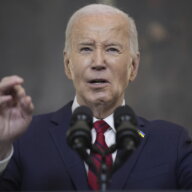 Steven Wright is Honest Abe in “The America Play.”
Steven Wright is Honest Abe in “The America Play.”
Credit: Rachel Dukeman/Plays & Players
Plays & Players is going surreal with “The America Play.” The show tells the tale of an African-American man who looks an awful lot like Abe Lincoln — and is willing to get shot, for a small fee. That’s until he slips down into the Great Hole of History.
Two short related plays, both titled “Other American Cousins,” open the performance.
Director Suzana Berger, a Penn grad and artistic director of Dragon’s Eye Theatre, tells us about the mix of comedy and tragedy audiences can expect.
“The America Play” is described as “an experimental examination of the missing side of American history.” What history are we talking about?
Stories of people and experiences that have often been ignored in the history books: African-Americans, women, people who feel they have to choose between family and pursuing a dream, single parents raising families on their own, children growing up without a father — stories that are deeply woven into the fabric of this country.
So, a black Abe Lincoln charges a fee to get shot — is that a show he puts on? Or can anyone shoot him?
The Lesser Known, as he calls himself, invites the public “to pay a penny, choose from a selection of provided pistols and shoot Mr. Lincoln.” In the play, we meet several people who’ve chosen to spend part of their Sunday afternoon on this unusual activity. The audience is left to consider what motivates each of them, what they get out of re-enacting the assassination.
Does the whole thing take place in the past?
Yes, but there are a lot of anachronisms. I interpret that as a wink to the audience that this family’s struggles could really be happening at any time, and that history isn’t as neatly set and in the past as we think it is.
The storyline is pretty out there. Would you call it a drama? A comedy?
This play is constantly putting tragedy and comedy on top of each other, mixing them with invented history and jazz musicality. It’s a play about America, in all its complexity, so like America, it can’t be pinned down to just one category.
What were some challenges that came up when you were directing?
[Playwright] Suzan-Lori Parks leaves plenty of room for interpretation in her script — a lot of hints in the dialogue about what the actions might be. We experimented with many different possibilities in rehearsal. With a team of such creative actors and designers, the challenge was often choosing between several exciting options for the same moment that all served the story.





























